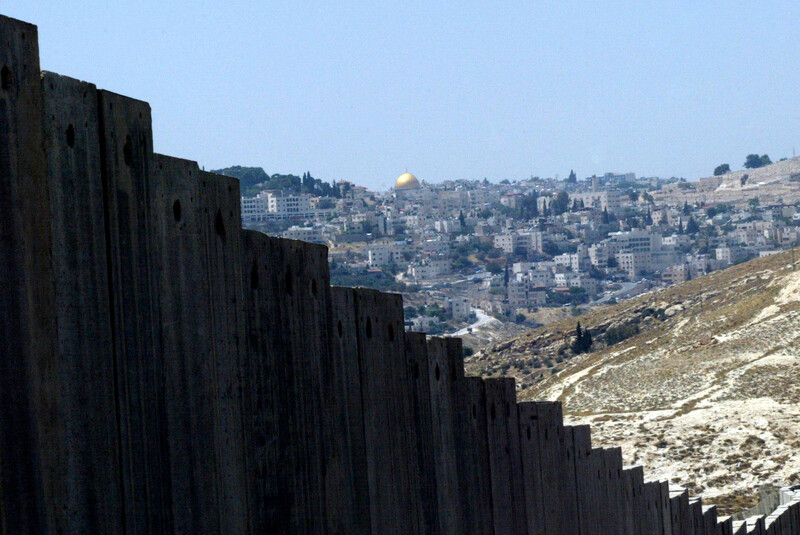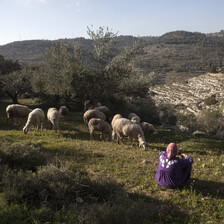The Electronic Intifada 18 May 2012

A trip from Abu Dis to Jerusalem once took minutes but now takes hours, for those “lucky” enough to pass through the checkpoints.
APA imagesThe young men cheer as their friends rev up the car. The vehicle suddenly hurdles at breakneck speed towards a tight junction that is just meters away, only to halt and swerve back towards us with an alarming screech. The men whoop at the success of the maneuver that has added to the oily skid marks on the road but left them back where they started.
Moving with dexterity within a constrained space is something that these young men I saw one Friday night during my recent travels in Palestine have become accustomed to over the last decade. They grew up in Abu Dis, a suburb of Jerusalem that found itself suddenly cut off from the rest of the city one night in 2002.
Mohannad, a friend in Abu Dis, recalls how a 24-hour curfew was imposed by the Israeli military that night. Nobody knew what they would find when they were allowed out of their homes again.
When my friend’s shepherd grandfather came out of his house, he found his world had shrunk overnight. A night of construction had left his tiny home cramped into a tight corner, surrounded on two sides by the concrete wall the Israelis had built. His sunlight had now been removed for much of the day, and the hills just a couple of hundred meters away were now inaccessible to his flock. “I used to play in those hills as a child,” my friend says matter-of-factly, hills which were taken away in the stealth of night.
Abu Dis was where the Israelis first started the construction of what the state describes as a “security barrier.” From some balconies in the town, you can see Jerusalem’s Dome of the Rock glinting in the sun, a house of prayer that used to be the destination of a short pilgrimage on foot but which now most Abu Dis residents can only see from afar. Only those lucky people who have a Jerusalem residency card are able to get to the rest of their city, and even for them, what was a seven minute bus journey now takes at least an hour, something I experienced myself one day.
Resilience
The bus queues at a checkpoint in a line of vehicles before everybody is ordered out by a soldier. We are herded into a caged area where we have to wait for our passports to be checked. I cannot imagine this becoming a normal and routine part of my daily commute, but for the “lucky” few residents of Abu Dis who can still access jobs and courses in the center of Jerusalem, it is. For most, the lives that they knew came to a sudden stop that first day of the wall a decade ago.
Rania, a 27-year-old woman, recalls how her university course could not continue. “I cannot help you,” an academic on the other side of the wall had said, after she tried to organize a continuation of lessons.
The wall is one of many hardships that Palestinians have had to endure. Despite this, I encounter a stoic resourcefulness and deadpan humor throughout my time there.
A middle-aged man breezily tells me about how he has been repeatedly put in prison without charge by the Israelis for a total of four years. His tip for how to get through interrogation is to “think about a beautiful woman; don’t let them know that what they are doing is important to you in any way.”
I meet the governor of Jenin, Qaddura Musa, who tells me his plans for improving the city in the northern West Bank, as if the fact that an occupier that has its own plans is a small matter that will soon be cleared up.
Sneaking in
The governor says that his city has development potential. However, as he reels off statistics about his city — the cultural attractions, the investor interest — he also mentions the fact that it has 72 km of wall surrounding it, and that the city has had a forest on its outskirts that has been removed by the wall.
The local authority nonetheless has proposed regeneration projects, despite the restrictions it faces. It is not, for example, allowed by the Israeli government to redevelop two abandoned Jewish-only settlements on the edge of Jenin, or even to touch the land surrounding them where trees had been cut down — as ever, ostensibly for “security reasons.”
“So we sneaked in,” says Musa with a mischievous grin, “and planted new trees.” The idea of breaking rules in order to improve your city, of subversively planting trees, is one of the many absurdities I encounter in Palestine. The governor’s evident delight in circumventing a small restriction belies the futility that underlines his work.
His local authority can produce and publish a development plan for the city, even though on the majority of the land that it administers the Palestinian authorities know that they cannot get permission from Israel to execute the plan. But still people remain active.
“Protecting a zoo”
One striking example is Sheerin al-Araj, an activist living in the village of al-Walaja near Bethlehem who has for six years been contesting in the courts the route proposed by the Israeli government for the wall. Unlike the shepherd I met in Abu Dis, she managed to obtain a map showing where it is proposed to be built in order to challenge the plans.
This shows that there will in effect be two walls, one on the other side of the valley from the settlement of Gilo, cutting into al-Walaja. “Why two walls?” al-Araj asks. “If you want to protect Gilo from us, from aliens, from whoever, they could just build the wall right around it and not have another one taking away our land.”
She had the opportunity to ask the Israeli government to explain what the security reason is to justify the wall cutting into the village. The government said something about protecting a zoo, she says. She is continuing her fight, against all odds, appealing a decision made by the Israeli high court last autumn, even though construction was well underway.
I wonder how so many of the Palestinians I meet are able to summon the energy to resist against all odds. I think I got an answer from al-Araj, as she recalling how her family, like so many other Palestinians, was forced to flee when the State of Israel was imposed on Palestine.
“We always thought we were coming back,” she said. “It wasn’t an easy thing to deal with, losing your home. Nobody believed that it wouldn’t be sorted out soon.” Despite the fact that many years have passed since then, Palestinians resolutely reject that the bizarre, unjust situation that is now the status quo will ever be a permanent reality.
Lee Baker is a writer based in London who usually reports on local government. His email is leebakerfreelance A T gmail D O T com


